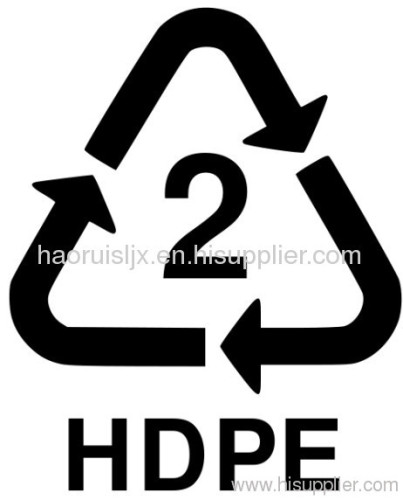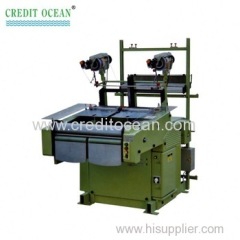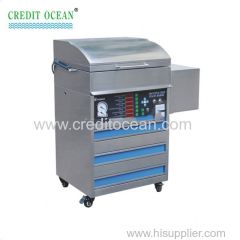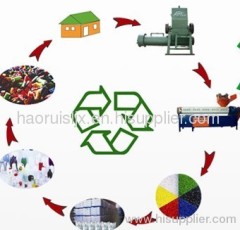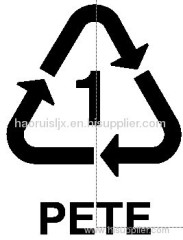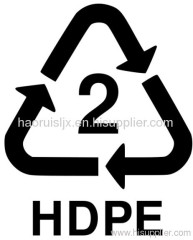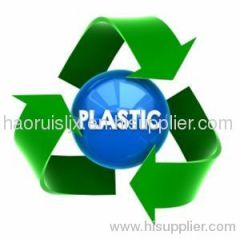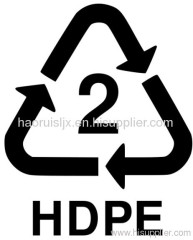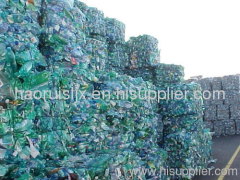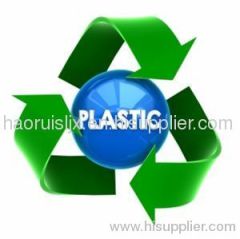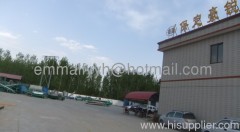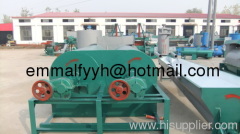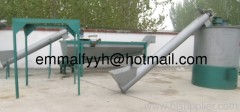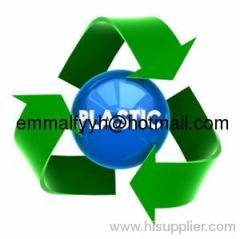
|
Baoding Haorui Machinery Manufacturing Co., Ltd.
|
Efficient HDPE plastic recycled machine
| Payment Terms: | T/T,L/C,WU, |
| Place of Origin: | Hebei, China (Mainland) |
|
|
|
| Add to My Favorites | |
| HiSupplier Escrow |
Product Detail
Stainless steel does not readily corrode, rust or stain with water as ordinary steel does, but despite the name it is not fully stain-proof
Stainless steel does not readily corrode, rust or stain with water as ordinary steel does,
but despite the name it is not fully stain-proof.
Sometimes it seems like modern America is one colossal plastic palace. The versatile material is in our cars, toys, packaging, clothing, home goods, food utensils, medical devices and so much more. It is also littering our streets, clogging our waterways and choking marine life. Many plastics can be readily recycled, but how do consumers make sense of all the different types and rules?
but despite the name it is not fully stain-proof.
Stainless steel differs from carbon steel by the amount of chromium present. Unprotected carbon steel rusts readily when exposed to air and moisture. This iron oxide film (the rust) is active and accelerates corrosion by forming more iron oxide, and due to the greater volume of the iron oxide this tends to flake and fall away. Stainless steels contain sufficient chromium to form a passive film of chromium oxide, which prevents further surface corrosion and blocks corrosion from spreading into the metal's internal structure, and due to the similar size of the steel and oxide ions they bond very strongly and remain attached to the surface.
- Code 2 (HDPE) - Milk Cartons and Product Containers
- Code 2 Products; such as plastic bags
- Plastic Recycling Symbol 1
Sometimes it seems like modern America is one colossal plastic palace. The versatile material is in our cars, toys, packaging, clothing, home goods, food utensils, medical devices and so much more. It is also littering our streets, clogging our waterways and choking marine life. Many plastics can be readily recycled, but how do consumers make sense of all the different types and rules?
Number 1 Plastics
PET or PETE (polyethylene terephthalate)
Found in:Soft drink, water and beer bottles; mouthwash bottles; peanut butter containers; salad dressing and vegetable oil containers; ovenable food trays.
Recycling: Picked up through most curbside recycling programs.
Recycled into: Polar fleece, fiber, tote bags, furniture, carpet, paneling, straps, (occasionally) new containers.PET plastic is the most common for single-use bottled beverages, because it is inexpensive, lightweight and easy to recycle. It poses low risk of leaching breakdown products. Recycling rates remain relatively low (around 20%), though the material is in high demand by remanufacturers.
PET or PETE (polyethylene terephthalate)
Found in:Soft drink, water and beer bottles; mouthwash bottles; peanut butter containers; salad dressing and vegetable oil containers; ovenable food trays.
Recycling: Picked up through most curbside recycling programs.
Recycled into: Polar fleece, fiber, tote bags, furniture, carpet, paneling, straps, (occasionally) new containers.PET plastic is the most common for single-use bottled beverages, because it is inexpensive, lightweight and easy to recycle. It poses low risk of leaching breakdown products. Recycling rates remain relatively low (around 20%), though the material is in high demand by remanufacturers.
Plastic Recycling Symbol 2
Number 2 Plastics
HDPE (high density polyethylene)
Found in: Milk jugs, juice bottles; bleach, detergent and household cleaner bottles; shampoo bottles; some trash and shopping bags; motor oil bottles; butter and yogurt tubs; cereal box liners
Recycling: Picked up through most curbside recycling programs, although some allow only those containers with necks.
Recycled into:Laundry detergent bottles, oil bottles, pens, recycling containers, floor tile, drainage pipe, lumber, benches, doghouses, picnic tables, fencing.
HDPE (high density polyethylene)
Found in: Milk jugs, juice bottles; bleach, detergent and household cleaner bottles; shampoo bottles; some trash and shopping bags; motor oil bottles; butter and yogurt tubs; cereal box liners
Recycling: Picked up through most curbside recycling programs, although some allow only those containers with necks.
Recycled into:Laundry detergent bottles, oil bottles, pens, recycling containers, floor tile, drainage pipe, lumber, benches, doghouses, picnic tables, fencing.
HDPE is a versatile plastic with many uses, especially for packaging. It carries low risk of leaching and is readily recyclable into many goods.
Plastic Recycling Symbol 3
Number 3 Plastics
V (Vinyl) or PVC
Found in: Window cleaner and detergent bottles, shampoo bottles, cooking oil bottles, clear food packaging, wire jacketing, medical equipment, siding, windows, piping
Recycling: Rarely recycled; accepted by some plastic lumber makers.
Recycled into: Decks, paneling, mudflaps, roadway gutters, flooring, cables, speed bumps, mats.
V (Vinyl) or PVC
Found in: Window cleaner and detergent bottles, shampoo bottles, cooking oil bottles, clear food packaging, wire jacketing, medical equipment, siding, windows, piping
Recycling: Rarely recycled; accepted by some plastic lumber makers.
Recycled into: Decks, paneling, mudflaps, roadway gutters, flooring, cables, speed bumps, mats.
PVC is tough and weathers well, so it is commonly used for piping, siding and similar applications. PVC contains chlorine, so its manufacture can release highly dangerous dioxins. If you must cook with PVC, don't let the plastic touch food. Also never burn PVC, because it releases toxins.
Plastic Recycling Symbol 4
Number 4 Plastics
LDPE (low density polyethylene)
Found in: Squeezable bottles; bread, frozen food, dry cleaning and shopping bags; tote bags; clothing; furniture; carpet
Recycling: LDPE is not often recycled through curbside programs, but some communities will accept it. Plastic shopping bags can be returned to many stores for recycling.
Recycled into: Trash can liners and cans, compost bins, shipping envelopes, paneling, lumber, landscaping ties, floor tile
LDPE (low density polyethylene)
Found in: Squeezable bottles; bread, frozen food, dry cleaning and shopping bags; tote bags; clothing; furniture; carpet
Recycling: LDPE is not often recycled through curbside programs, but some communities will accept it. Plastic shopping bags can be returned to many stores for recycling.
Recycled into: Trash can liners and cans, compost bins, shipping envelopes, paneling, lumber, landscaping ties, floor tile
LDPE is a flexible plastic with many applications. Historically it has not been accepted through most American curbside recycling programs, but more and more communities are starting to accept it.
Plastic Recycling Symbols 5
Number 5 Plastics
PP (polypropylene)
Found in: Some yogurt containers, syrup bottles, ketchup bottles, caps, straws, medicine bottles
Recycling: Number 5 plastics can be recycled through some curbside programs.
Recycled into: Signal lights, battery cables, brooms, brushes, auto battery cases, ice scrapers, landscape borders, bicycle racks, rakes, bins, pallets, trays
PP (polypropylene)
Found in: Some yogurt containers, syrup bottles, ketchup bottles, caps, straws, medicine bottles
Recycling: Number 5 plastics can be recycled through some curbside programs.
Recycled into: Signal lights, battery cables, brooms, brushes, auto battery cases, ice scrapers, landscape borders, bicycle racks, rakes, bins, pallets, trays
Polypropylene has a high melting point, and so is often chosen for containers that must accept hot liquid. It is gradually becoming more accepted by recyclers.
Plastic Recycling Symbol 6
Number 6 Plastics
PS (polystyrene)
Found in:Disposable plates and cups, meat trays, egg cartons, carry-out containers, aspirin bottles, compact disc cases
Recycling:Number 6 plastics can be recycled through some curbside programs.
Recycled into: Insulation, light switch plates, egg cartons, vents, rulers, foam packing, carry-out containers
PS (polystyrene)
Found in:Disposable plates and cups, meat trays, egg cartons, carry-out containers, aspirin bottles, compact disc cases
Recycling:Number 6 plastics can be recycled through some curbside programs.
Recycled into: Insulation, light switch plates, egg cartons, vents, rulers, foam packing, carry-out containers
Polystyrene can be made into rigid or foam products -- in the latter case it is popularly known as the trademark Styrofoam. Evidence suggests polystyrene can leach potential toxins into foods. The material was long on environmentalists' hit lists for dispersing widely across the landscape, and for being notoriously difficult to recycle. Most places still don't accept it, though it is gradually gaining traction.
Plastic Recycling Symbol 7
Number 7 Plastics
Miscellaneous
Found in: Three- and five-gallon water bottles, 'bullet-proof' materials, sunglasses, DVDs, iPod and computer cases, signs and displays, certain food containers, nylon
Recycling:Number 7 plastics have traditionally not been recycled, though some curbside programs now take them.
Recycled into: Plastic lumber, custom-made products
Miscellaneous
Found in: Three- and five-gallon water bottles, 'bullet-proof' materials, sunglasses, DVDs, iPod and computer cases, signs and displays, certain food containers, nylon
Recycling:Number 7 plastics have traditionally not been recycled, though some curbside programs now take them.
Recycled into: Plastic lumber, custom-made products
A wide variety of plastic resins that don't fit into the previous categories are lumped into number 7. A few are even made from plants (polyactide) and are compostable. Polycarbonate is number 7, and is the hard plastic that has parents worried these days, after studies have shown it can leach potential hormone disruptors.
Didn't find what you're looking for?
Post Buying Lead or contact
HiSupplier Customer Service Center
for help!
Related Search
Recycled Hdpe
Hdpe Plastic
Recycled Plastic Granules
Hdpe Film Machine
Hdpe Film Blowing Machine
Hdpe Plastic Bottle
More>>

